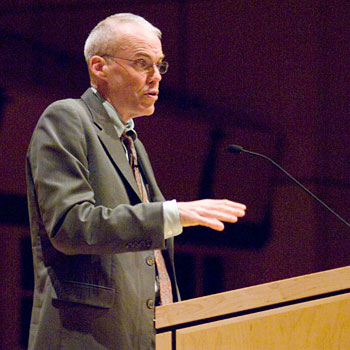I saw Bill McKibben speak at Harvard last night.
He talked about what it would take for human life to flourish. He focused on actions we could take locally. He talked about the moral imperatives for action. He talked about how perhaps the biggest impact of cheap fossil fuels on our lives to date has been to make us lonelier.
He talked about how important it is to decentralize our production of energy, our production of food, our financial system... if human kind is to flourish.
While focusing on the value of decentralizing our energy, food and capital, he talked about the value of building meaningful and tight bonds between people and bringing us closer together as communities. He talked about how people have 10 times more conversations with their neighbors at a farmers market than they do at the supermarket.
He talked about how since the 50's we've been using fossil fuel to build bigger homes that are farther and farther apart. How in the 50's we had twice as many close friends as we do today, how we had twice as many meals with friends and families as we do today, how our personal happiness as a society peaked in 1956 and that while our average income and GDP has increased 3 fold since that time, our happiness is declining.
That we can build a world where at the same time we are happier with our lives and a world where we use substantially less fossil fuels. He reminded us this is very possible. We need to look no further than the example of Western Europeans who use half the energy per capita as Americans, but are much happier, healthier and live longer.... and they have a lot of room for improvement!
He suggested that if a financial institution like AIG or Lehman Brothers is too big too fail, the answer isn't bailouts, the answer is that we shouldn't let them get so big that our entire global economy is threatened if they make a few bad decisions.
He talked about how fossil fuels naturally lead to centralized solutions for energy and food production, but how wind and solar power are naturally decentralized and the advantages (and tradeoffs) inherent in that decentralization.
He talked about how farmers markets are the fastest growing part of the food economy, how people build community and personal relationships at farmers markets, how 100,000 people in Madison, WI shop at farmers markets every week, fundamentally changing how food is grown in that area of the country.
He announced his next big initiative which is set for October 10, 2010. He announced that day will be a global work party, a day dedicated to highlighting the work that we are all doing at a local level to address climate change and to move towards a sustainable world.
What actions will we have to show on October 10th?

No comments:
Post a Comment